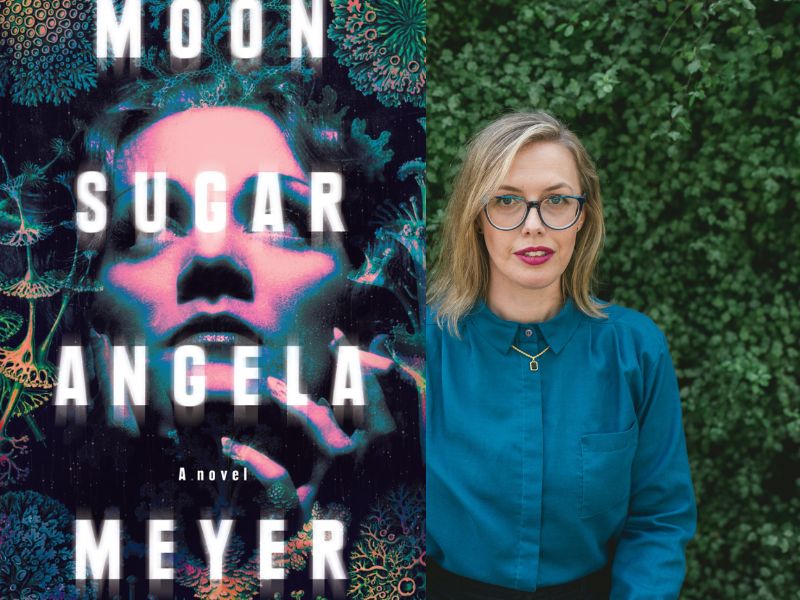Chances are, you’re familiar with what I’ve termed in my mind ‘the post-lockdown Europe trip.’ Piazzas, cathedrals, paradisal beaches, Aperol spritzes, fluorescent festivals and other glimpses of Melbourne-based people revelling on the continent have been cascading down my Instagram feed since June this year.
After an eternity of confinement to one’s locality, the widespread splurge couldn’t be more understandable. Who knows whether a change of scenery will be barred again?
Moon Sugar, a seductive and profound novel by Angela Meyer, portrays an iteration of this getaway cut short. Josh, a Melbournian who financed his trip through enthusiastic sugar babying, has vanished in an apparent suicide in Berlin. Shocked by the news are Mila, his client, and Kyle, his housemate and friend.
As if on autopilots of grief, both are propelled across the world themselves, and wind up united in a bid to gain more context for the loss, unable to allay a hunch that things are not as they seem. A mysterious type of lichen called Xanthoria, sampled by Josh and Mila in a secret trial months before, is eventually judged as key to his disappearance.
From start to finish, Moon Sugar richly and resonantly depicts its characters’ inner-workings and concerns, and how they prompt their behaviour. The focus is mostly upon Mila, a 40-year-old personal trainer contending with a deep dysphoria that is kept hazy around the edges, rather than linked irrefutably to the disappointments of her life. Mila is broke, and anxious about her ageing parents. She has been single for a few years, since the end of a decade-long relationship with a man who was often distant with depression and, unlike her, uninterested in having children.
Meyer is unsettlingly, but appreciably attuned to how we can quash our yearnings in the name of love, grow disconnected from ourselves in trying to appease others, feel defeated by the irrevocability of it all. Mila contemplates ‘[her ex’s] words coming out of her mouth,’ the ongoing lag in her comprehension following, ‘the abrupt termination of what life would look like. What life was even about.’
Kyle, steeling himself in the wake of divorce, can relate. He is earnest, harmless, a list-maker who weeps easily and thinks of his pet cat as a ‘floofy boi’ (Moon Sugar is studded with the language of social media, and it reads natural and constructive rather than as forced timeliness). He does not coordinate effortlessly with Mila’s distracted irascibility.
The unlikeliness of their alliance makes for some of the novel’s funniest moments: Mila could be Kyle’s mother and yet, with principle, certainly doesn’t care to mother him.
Clashes aside, both are quietly struggling to locate a sense of fulfilment beyond finding Josh, and both are resigned to seeing themselves as innately subsidiary rather than protagonistic: Mila a Max Brod when she once longed to be Kafka; Kyle the Robin to the ‘tall, bright and queer superhero Josh.’
Josh, with his lust for life and encouraging nature, is an unmatched bright-spot for Mila and Kyle. Mila thinks, ‘He is always generous, open, thinks about the motivations behind people and art […] It is not the way people always are — especially online’. Sex with him has been a revelation, challenging the shame and affectation she’s long defaulted to, allowing her to ‘be in touch with her eroticism […] filling the dark places within her.’
Throughout Moon Sugar queerness is delved into in a manner that is importantly, cognisant and honest. Mila reflects on feelings of confusion and unease, of curtailing her interest in women from a young age. Josh promotes an irrepressible passion for all bodies, but recognises the enduring difficulty of owning or exploring queer desire when ‘cisheteronormative, patriarchal capitalism is a dominant and pervasive force.’ (Fans of Sally Rooney may enjoy the balance of the cerebral and the plainly carnal Moon Sugar retains.)
Once the lab lichen becomes active in Mila, she and Kyle’s mission accelerates, and there’s less room for either to brood. The text shifts seamlessly from realism into something replete with exquisite snapshots of a heightened world. Whereas another writer might have firmly cast Xanthoria as alien, Meyer renders its effects to literary ends; it enables Mila to feel endless potential, the antithesis of emptiness.
Read: Book review: Alchemy, Wendy Sharpe and Kate Forsyth
The substance dials up questions about human insularity, our tendency to get shunted into tunnel vision, ignorant of the myriad other things there are to consider, savour, conserve. A concept as humble as openness starts to feel like a reprieve. Moon Sugar flouts reality not to reject it, but to reveal its richness.
Moon Sugar by Angela Meyer
Publisher: Transit Lounge
ISBN: 9780648414056
Pages: 256 pp
Publication date: Date: 1 October 2022
RRP: $29.99





